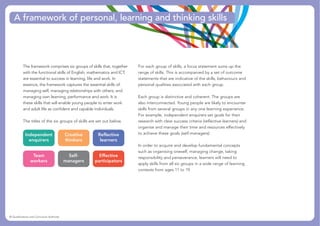Weitere ähnliche Inhalte
Ähnlich wie New Level 2 Specification Sept 2010
Ähnlich wie New Level 2 Specification Sept 2010 (20)
Mehr von Georg Coakley (20)
New Level 2 Specification Sept 2010
- 1. A framework of personal, learning and thinking skills
The framework comprises six groups of skills that, together For each group of skills, a focus statement sums up the
with the functional skills of English, mathematics and ICT, range of skills. This is accompanied by a set of outcome
are essential to success in learning, life and work. In statements that are indicative of the skills, behaviours and
essence, the framework captures the essential skills of: personal qualities associated with each group.
managing self; managing relationships with others; and
managing own learning, performance and work. It is Each group is distinctive and coherent. The groups are
these skills that will enable young people to enter work also interconnected. Young people are likely to encounter
and adult life as confident and capable individuals. skills from several groups in any one learning experience.
For example, independent enquirers set goals for their
The titles of the six groups of skills are set out below. research with clear success criteria (reflective learners) and
organise and manage their time and resources effectively
Independent Creative Reflective to achieve these goals (self-managers).
enquirers thinkers learners
In order to acquire and develop fundamental concepts
such as organising oneself, managing change, taking
Team Self- Effective responsibility and perseverance, learners will need to
workers managers participators
apply skills from all six groups in a wide range of learning
contexts from ages 11 to 19.
© Qualifications and Curriculum Authority
- 2. Independent enquirers Creative thinkers Reflective learners
Focus: Focus: Focus:
Young people process and evaluate information in Young people think creatively by generating and Young people evaluate their strengths and limitations,
their investigations, planning what to do and how to exploring ideas, making original connections. They setting themselves realistic goals with criteria for
go about it. They take informed and well-reasoned try different ways to tackle a problem, working with success. They monitor their own performance and
decisions, recognising that others have different others to find imaginative solutions and outcomes progress, inviting feedback from others and making
beliefs and attitudes. that are of value. changes to further their learning.
Young people: Young people: Young people:
identify questions to answer and problems to resolve generate ideas and explore possibilities assess themselves and others, identifying
plan and carry out research, appreciating the ask questions to extend their thinking opportunities and achievements
consequences of decisions connect their own and others’ ideas and set goals with success criteria for their development
explore issues, events or problems from different experiences in inventive ways and work
perspectives question their own and others’ assumptions review progress, acting on the outcomes
analyse and evaluate information, judging its try out alternatives or new solutions and follow invite feedback and deal positively with praise,
relevance and value ideas through setbacks and criticism
consider the influence of circumstances, beliefs adapt ideas as circumstances change. evaluate experiences and learning to inform future
and feelings on decisions and events progress
support conclusions, using reasoned arguments communicate their learning in relevant ways
and evidence. for different audiences.
Team workers Self-managers Effective participators
Focus: Focus: Focus:
Young people work confidently with others, adapting to Young people organise themselves, showing personal Young people actively engage with issues that affect
different contexts and taking responsibility for their own responsibility, initiative, creativity and enterprise with them and those around them. They play a full part in
part. They listen to and take account of different views. a commitment to learning and self-improvement. the life of their school, college, workplace or wider
They form collaborative relationships, resolving issues to They actively embrace change, responding positively community by taking responsible action to bring
reach agreed outcomes. to new priorities, coping with challenges and looking improvements for others as well as themselves.
for opportunities.
Young people: Young people:
collaborate with others to work towards common Young people: discuss issues of concern, seeking resolution where
goals seek out challenges or new responsibilities and needed
reach agreements, managing discussions to achieve show flexibility when priorities change present a persuasive case for action
results work towards goals, showing initiative, commitment propose practical ways forward, breaking these
adapt behaviour to suit different roles and situations, and perseverance down into manageable steps
including leadership roles organise time and resources, prioritising actions identify improvements that would benefit others
show fairness and consideration to others anticipate, take and manage risks as well as themselves
take responsibility, showing confidence in deal with competing pressures, including personal try to influence others, negotiating and balancing
themselves and their contribution and work-related demands diverse views to reach workable solutions
provide constructive support and feedback to others. respond positively to change, seeking advice and act as an advocate for views and beliefs that may
support when needed differ from their own.
manage their emotions, and build and maintain
relationships.
© Qualifications and Curriculum Authority

